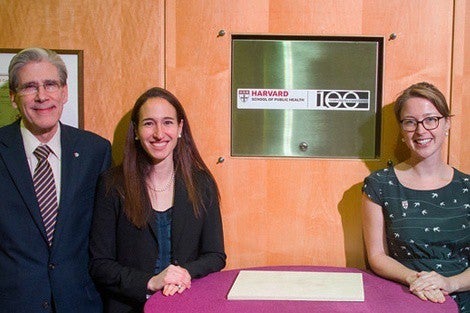February 19, 2014 —The Harvard School of Public Health (HSPH) year-long Centennial celebration continued with the installation of a time capsule in the lobby wall of the FXB building, where it will remain unopened until 2063. Deans Julio Frenk and David Hunter lifted the box into place at a celebration with faculty, students, and staff on February 12, 2014.
 Dean Frenk described the time capsule — which is filled to the brim with records of the School’s scientific achievements, mementos from last fall’s Centennial celebration, and messages from students, faculty, staff, and alumni — as a way to share HSPH’s culture with a future generation.
Dean Frenk described the time capsule — which is filled to the brim with records of the School’s scientific achievements, mementos from last fall’s Centennial celebration, and messages from students, faculty, staff, and alumni — as a way to share HSPH’s culture with a future generation.
Christina Roberto, assistant professor of social and behavioral sciences and nutrition, and Rebecca Hope, MPH ’14, offered remarks about what they envision public health will look like in the next 50 years. (Roberto and Hope are pictured above, left to right, with Dean Frenk.)
Roberto described her hope that public health professionals will develop a more strategic approach to working with policy makers to turn scientific research into lasting change.
 Hope reflected on what it will be like to see her fellow members of the School’s Centennial class at their 50th reunion. “Perhaps, if we are effective in our public health work, we will be considered middle aged in 2063 — even though we will be around 80,” she said.
Hope reflected on what it will be like to see her fellow members of the School’s Centennial class at their 50th reunion. “Perhaps, if we are effective in our public health work, we will be considered middle aged in 2063 — even though we will be around 80,” she said.
Hope wondered whether public health will shift in emphasis over the next 50 years. “Resources for medical and public health services will, most likely, remain limited in much of the world. And so, the focus will, by necessity, be less on developing the next new medical and public health technology,” she said. “To gain the kinds of improvements in human health experienced in the last 50 years, we will have to focus more on the creative, effective, caring implementation of what we already know about how to improve health.”
Photos: Michael Mazzanti
